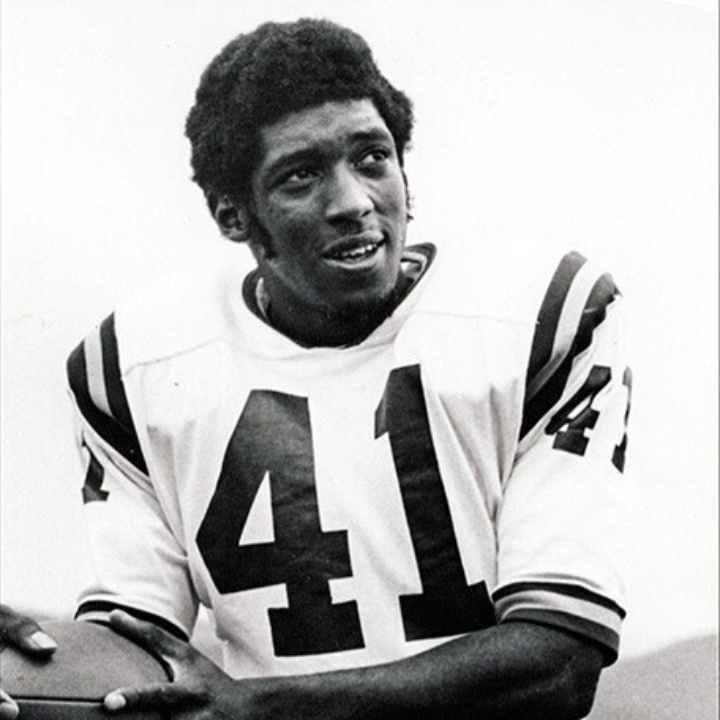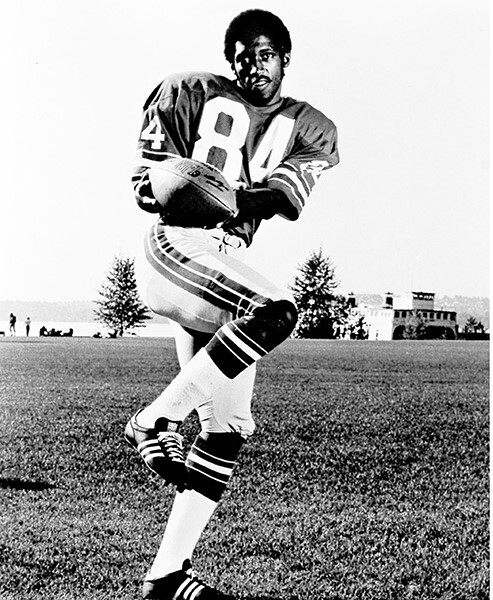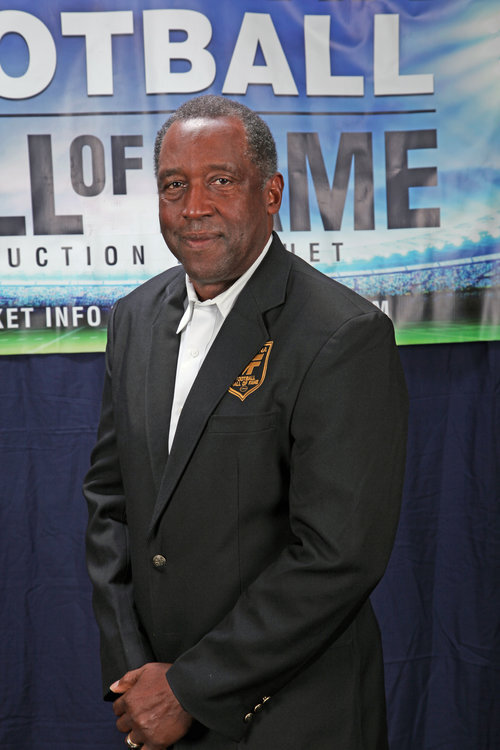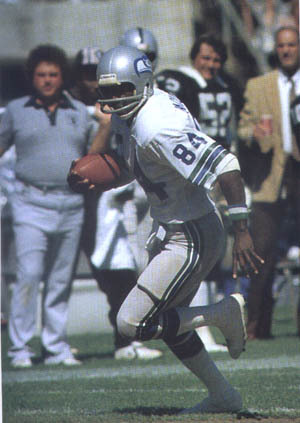
Catching Up With Former Player Rep: Sam McCullum
Drafted by the Minnesota Vikings in 1974 out of Montana State University, Sam McCullum went on to play an impactful 10-season career between the Minnesota Vikings and Seattle Seahawks. Sam retired from the league with 274 receptions for 4,017 yards and 26 touchdowns. In 1993, McCullum was inducted into the Montana State Hall of Fame, in 2011 he was inducted into the Kalispell Legends Wall of Fame, and in 2018 he was inducted into the Montana Football Hall of Fame. We caught up with the former NFLPA Player Rep and Executive Committee Member and he gave us insight into his life during and after football.

What inspired you to become a Player Rep?
I think what inspired me the most was just the lack of communication we're getting from management. They were never telling us what we needed to hear, they were telling us what they wanted us to hear. We had guys come through at the time that were really saying, look, we need to find a way to better communicate with people, communicate with ourselves and not be advised by ourselves. Because the NFL survived by creating conflict between not just the teams, but even within each team structure, the different departments. The defensive backs didn't talk very much, and the other guys didn't talk very much. So, getting involved in the NFLPA as I did with Gene and Dick Berthelsen. I mean, they talked about the issue of unity, getting the whole team on the same page and that was just what intrigued me to get guys all on the same page working toward a common goal, which we hadn't had ever before. That was a big part of why I got involved. It was just being able to create that team unity and have us all looking at the same thing.
What lessons were you able to take away from your experience as a Player Rep?
I think what I took away is that we all had power we didn't know we had. Because the NFL was very good at taking your power away. When you came there, you signed a contract that they had for you. You went to training camp when they told you. You had no power, but then we got involved. We realized we did have power. We had a voice, and our voice was such that if we were educated and understood the issue, we could make a difference. That gave me the confidence to know that the things that I was doing within that structure were things I understood and things I knew the ramifications of. I knew what the outcome would be if we stayed together as a group. So, it gave us all a voice that we knew we had, which gave us power.

What is a piece of advice that you have for players transitioning out of football?
I think the biggest thing I can give them is that you don't have to look down on doing things with other people. We hit the pinnacle of our lives. The pinnacle of making more money than anybody around us. When we go back to the community, you tend to look down on people who are doing what we think are meaningless jobs, whether it be just doing accounting, or just doing bookkeeping. Many times, it’s a hard time adjusting because we look down because we want to maintain that celebrity status. I tell guys all the time, look around and look at what makes people happy. Look at what makes you happy and forget about the fact that you're an NFL player. Take what you learn in the NFL and apply it to everyday life. You don't have to be an NFL player first. You can be an NFL player second or third. I ended up doing some real estate development after I left. It was just me in a room for hours on days looking at different projects and I did that for months and months on end, but I was fine with it because I was learning so much. It wasn't like I had to walk out there and shake someone's hand or sign an autograph or get a free drink with someone, a free dinner to feel like I was important. I found a way to be happy at the same time, still be an NFL player but be happy myself without having to judge everything around being an NFL player, and that's the hard part. Some guys can walk away, some guys can't. I look at some of these guys on TV and they're doing something that's wonderful, but they're still NFL players first. A guy that worked at General Motors for 30 years on the line, left General Motors. He's got a nice house. He’s got a nice pension, he’s got all the cars he wants, he's got a nice family. Does he think that he's still a General Motors worker first or is he a family man or is he a businessman? Is he a hobbyist? Where does he find his passion? Too many times, we as NFL players, we're always going to be an NFL player first and everything else takes a back seat and that's where we get in trouble because we can't walk that line.
What is a piece of advice that you wish you had early in your career?
I think the biggest piece of advice that I would give myself if I had to do it all over again is to think beyond tomorrow because so much was about today. We're always focused on game one, game two, and game three, then the season is over, and we focus on the next season. We forget to look down the road sometimes and we always think that down the road it will eventually work itself out, and sometimes it does and sometimes it doesn’t. My father always said, "You're only going to play this game for a few years. Look at it. What are you going to do when you're done? You have the opportunity to prepare for that now." He really straightened me out after my first year and sure enough I started studying and doing different things in the off-season. Things I do on my own time when I'm not playing golf or doing interviews or signing autographs, I can do things and work and do different things. So when it comes time to transition, it's much easier for me than most. I wish I'd started it sooner. I wish I had started my first summer and I didn’t because I was so excited to play. I thought I was going to play for 10 years and make all this money. And we know that's not the norm. So, my father just said, “What do you got to do next?" Think about it. You got the ability to do things that you want because you've got the money, you got the time.” It didn't have to be something flashy but started thinking and planning for that. One of the things they told us in the first year was if you start thinking about retirement now, you’ll retire before you know it because you'll take this up. I always thought that didn't make sense. Everybody plans retirement, but they didn't want us to think about it or talk about it because it kept us focused on the game itself. They want you to feel that your only chance in life is to be an NFL player and not think about post-NFL.

What are you doing now in your career?
I am retired, and I am a trustee for NFL Player Benefits. I am one of the trustees that manages the player benefits program. I work with Bethany; I work with Miki Yaras and Tom DePaso and Heather, and I work with Andre, and I work with all of them to manage player benefits and their program. So, that's something I've been doing now since about 2008. But after I left football, I went back to school on my own. I finished school. I went back to get a degree to be a stockbroker. I got my stockbroker's license. I got my real estate license, something I wanted to do as I was trying to find that niche in my life. That's something I wanted to do. That's why I ended up being a real estate developer, so I'm proud of that. I ended up working in the state government for four years. My dad was a career military man. He spent 45 years in the military in the FAA. We were always on military bases, but I didn't want that. But my dad always talked about a commitment to service. You've got to give back something you get, and you get good things to pay it forward. I ended up going to work with the state government in Olympia which is 70 miles from my house, and I commuted every day for four years. I ended up working in my own business in food and beverages for the next 17 years before I finally sold out. That taught me a great deal that I had the expertise. I had the knowledge to be able to go into private business for myself after all those years. And so, I did. Then when I retired in 2013 from doing my multiple business’, I was really well prepared for that. Those things from the preparation in 1982 during the strike, to post football, to when I finally got out and worked for the state for four years, all prepared me for the point where I had my own businesses when I'm putting in 100, 120 hours a week working my own businesses for a while and making success and selling them and so I can retire when I hit 60. I was really quite happy in that scenario.
How have you been able to apply the lessons you learned from both football and being a Player Rep to your post-playing career?
Well, so much of what we do as an athlete is being disciplined, and so much we do as an athlete is planning because we just can't walk out in the field and be successful. We have to walk on the field with a game plan, you're planning how to defeat your opponent, how to be successful, how to be good at what you do, how to be prepared and everything. You're planning all these things. I learned this even more so as a Player Rep because for every Player Rep meeting, I had with my own individual team or the big wigs, we had to do a lot of preparation because everyone had questions, and everyone came to the meeting with different ideas and different agendas. Back in those days, there were a lot of guys who weren't quarterbacks who wanted quarterback money, and as a quarterback they wanted to maintain their status. Everybody had different agendas, and we came to the same meeting where there was always fighting, discussions, arguments, all those things. When I left football planning was so important for me. Before I went into a meeting or before I went to my office every day, I’d make notes of the things I wanted to accomplish that day. What do I have in front of me that I need to get done and how do I get it done? Being a Player Rep took discipline, organization and climbing, the purpose of the climbing was important. We look at the current state of NFL players today, we think that they're soft. We think that because they go to training camp, they get a day off in training camp, they don't hit every day, they don't wear the pads twice a day. We did those things, we hit every day. We wore pads for both practices. We didn't have water in the field. We didn't have water breaks, and on and on and on. And we look at the guys today and they have all those things and we think, wow they're being soft, but we realized that back then we were very lucky that we were able to survive that because there was a lot of guys that could have really faced much more critical situations from their own health and well-being from the schedules we had because our schedules were just crazy. But we survived because we found a way to, and we knew that older guys would talk to us about how to survive. We tell the guys that came after us how to survive. The other side of that is that, with today's current players, they get paid to work out in the off season. We didn't, we left after our last physical after the last game, they said, "we'll see you in training camp, come back in shape" and we had to go out and find a job, do things on our own, find a place to work out, and then work out on a schedule on our own. If we were lucky, we were in a city where there's other players, but for the most part, we were on our own. We had to do that every day at the same time trying to have a life. I worked full-time jobs most of the offseason for years. I'd work out on the weekends. I work out at night. That discipline was so important that I was able to transfer everywhere I went because I was able to do it, and it was easy to do other things as well for that discipline.